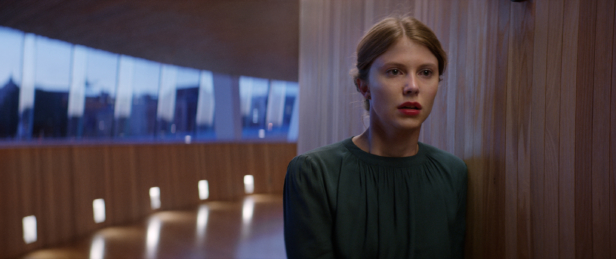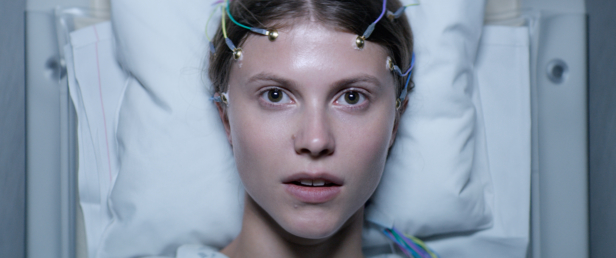Relative newcomer Eili Harboe gives an impressive powerhouse performance in Joachim Trier’s supernatural horror Thelma. She plays a young woman struggling with her repressed sexuality who has just entered university. The time to experiment truly arrives with Thelma choosing to rebel against her strict Christian upbringing and embrace her feelings for a fellow female classmate. Trier’s film shares traces of DNA with Carrie in its coming-of-age structure and the way all hell breaks loose in its final third. Eili took the time to speak to us over the course of the 2017 London Film Festival where Thelma headed up the Cult strand.
What attracted you to the character of Thelma?
I read the script before I went to the third round of auditions and I was so excited about the story. It’s beautifully written and the character of Thelma is very complex. She’s vulnerable and strong but she’s not a victim. Portrayal of female characters is especially important to me and that’s why I try to make conscious choices about that and not accept a character that’s a buffer for a male one. Thelma drives the whole story forward. She goes on this emotional journey and I think that was very challenging but also so exciting for me as an actress to grasp where she comes from and how she ends up where she is. Joachim is definitely a director I wanted to work with. He has done some incredible films in the past. He has an ability to portray human relationships and the complexity and layered feelings of grief and insecurity but also love and all those struggles we have as humans.
Joachim Trier told me about a scene where you have a real snake crawling up your leg. Was it scary to film that?
I have nothing against snakes. It’s funny because when you look at a snake you would expect it to be slimy but it’s warm. They’re soft and warm. Their movement is a little bit unpredictable but so long as I knew that this snake did not have any venom I was fine. It could bite me but it would not be fatal. The animal trainer was on set and he was like the snake whisperer. He didn’t speak that much English but he was so calm. If they put a big grey rat in I don’t think I could have done that. I’m staying in New York and I’ve seen about twenty rats so I think I’m getting over my phobia.
You took on many new physical challenges for the film and even visited a doctor to learn about PTSD seizure therapy. Why was that important to you?
There were a lot of physical challenges for me. I did swimming and diving lessons as well as seizure therapy. I got the part in July and we started shooting in September. I learnt how to do the breaststroke in two months. The production said they were going to use a stand-in for those scenes but I really wanted to do as much as possible myself. There are only three shots in the film that are not me because I had an ear infection. I was swimming every day after set and I was constantly pushing myself but I went too far at that particular point. I struggled a bit with that because I had the goal of doing everything myself.
Were there any particular films you watched for research?
Joachim wanted me to see The Piano Teacher with Isabelle Huppert. I love that film and though it’s definitely not a horror film it’s about the complexity of the character who is seen struggling with passion and she doesn’t know how to cope with that.
Are there any other characters in film history who you admire?
My favourite film is Mulholland Drive by David Lynch. That’s a very different kind of story. Those characters are very strong even though one of them is a victim in a sense. She’s insecure in a way but to be strong doesn’t mean to be tough. And Twin Peaks I love too. Even the woman, the waitress, who has been abused by her husband she is a strong character. She has this inner conflict about how she can be liberated from this situation. You can portray a woman that’s trapped in a way but still if she has that complexity it will still be a strong female character.
Thelma is in cinemas now. Read our review here and our interview with director Joachim Trier here.

